译林版(2019)必修第二册Unit 3 Festivals and customs. Grammar and usage 课件(共28张PPT)
文档属性
| 名称 | 译林版(2019)必修第二册Unit 3 Festivals and customs. Grammar and usage 课件(共28张PPT) | 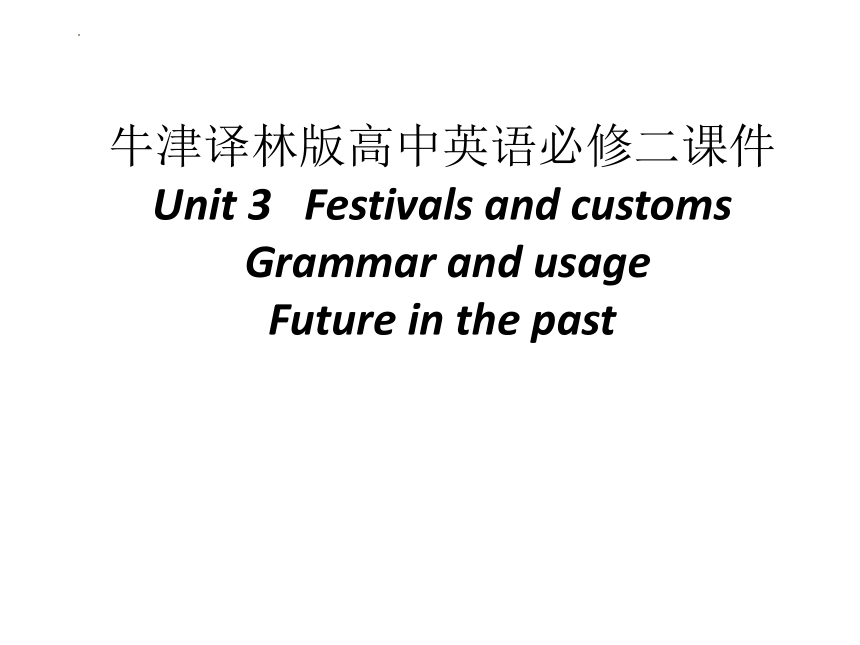 | |
| 格式 | pptx | ||
| 文件大小 | 108.0KB | ||
| 资源类型 | 教案 | ||
| 版本资源 | 牛津译林版(2019) | ||
| 科目 | 英语 | ||
| 更新时间 | 2023-07-31 14:39:52 | ||
图片预览

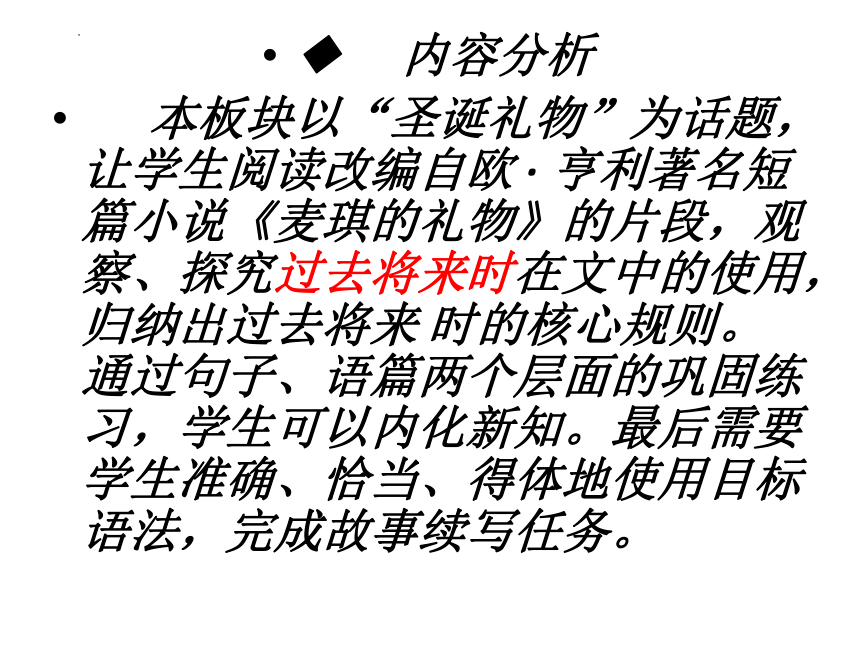
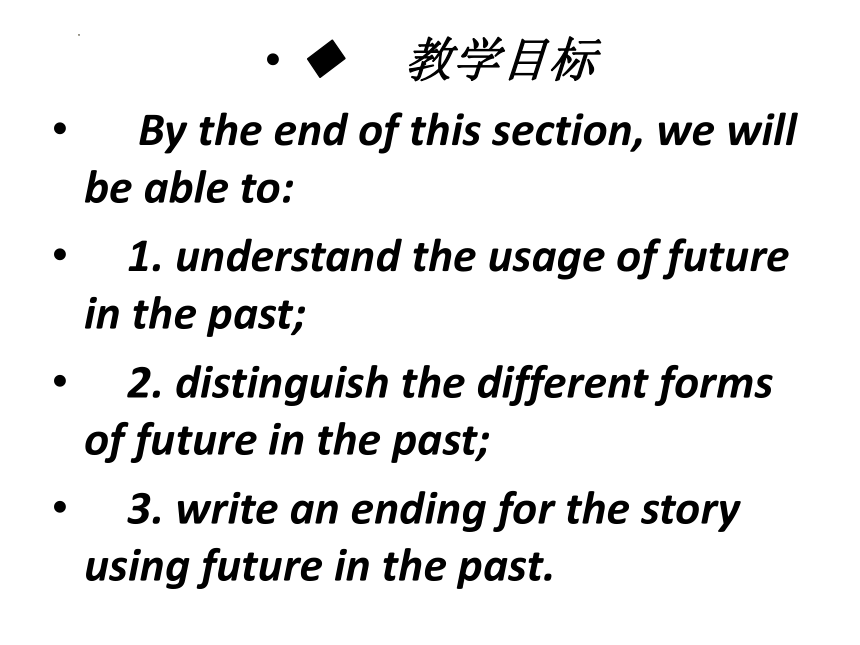
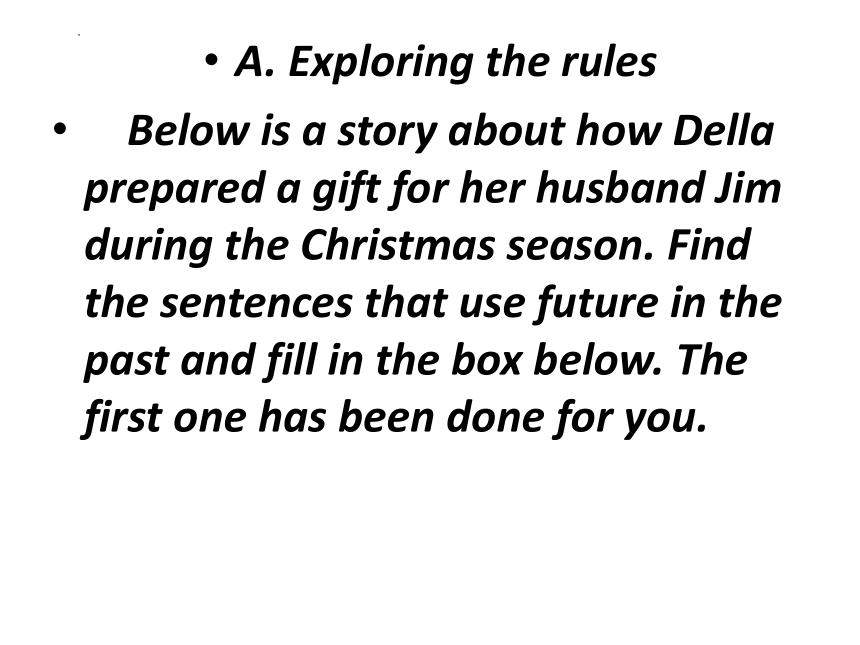
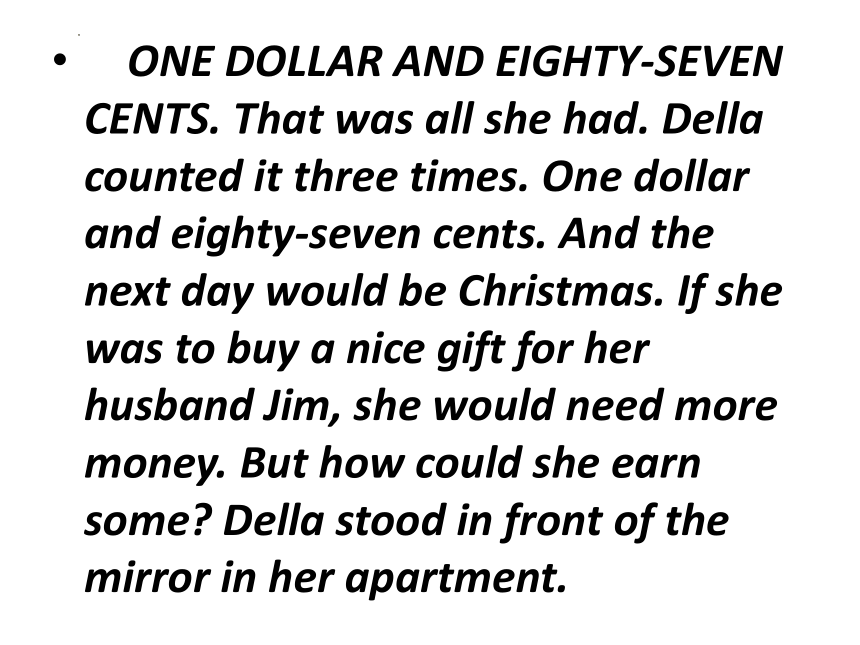
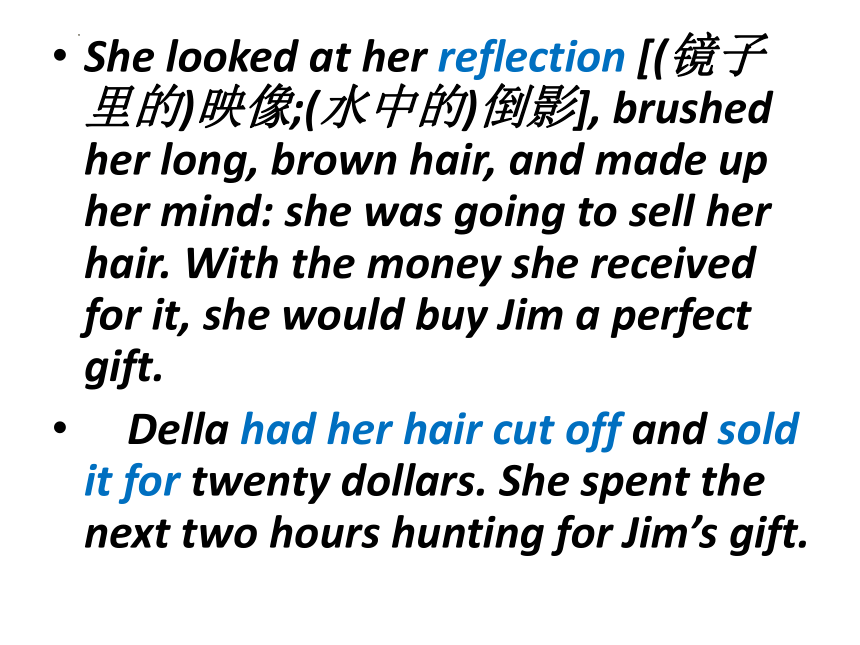
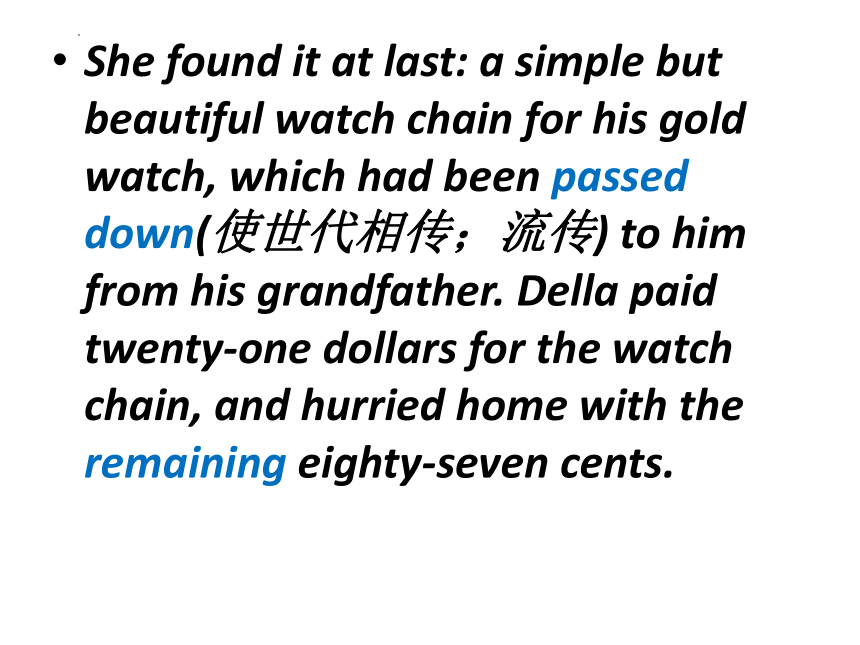
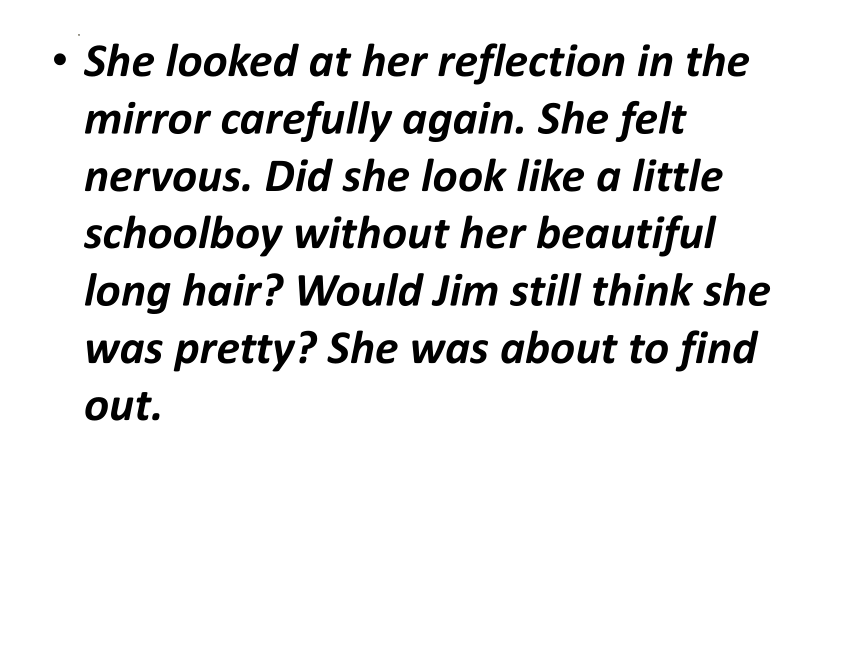
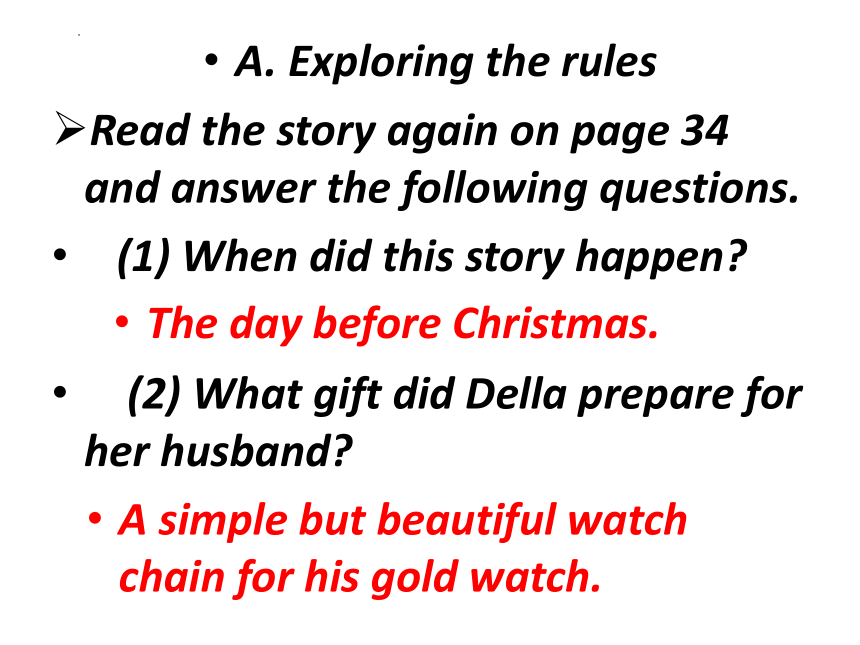
文档简介
(共28张PPT)
牛津译林版高中英语必修二课件
Unit 3 Festivals and customs
Grammar and usage
Future in the past
◆ 内容分析
本板块以“圣诞礼物”为话题,让学生阅读改编自欧 · 亨利著名短篇小说《麦琪的礼物》的片段,观察、探究过去将来时在文中的使用,归纳出过去将来 时的核心规则。通过句子、语篇两个层面的巩固练习,学生可以内化新知。最后需要学生准确、恰当、得体地使用目标语法,完成故事续写任务。
◆ 教学目标
By the end of this section, we will be able to:
1. understand the usage of future in the past;
2. distinguish the different forms of future in the past;
3. write an ending for the story using future in the past.
A. Exploring the rules
Below is a story about how Della prepared a gift for her husband Jim during the Christmas season. Find the sentences that use future in the past and fill in the box below. The first one has been done for you.
ONE DOLLAR AND EIGHTY-SEVEN CENTS. That was all she had. Della counted it three times. One dollar and eighty-seven cents. And the next day would be Christmas. If she was to buy a nice gift for her husband Jim, she would need more money. But how could she earn some Della stood in front of the mirror in her apartment.
She looked at her reflection [(镜子里的)映像;(水中的)倒影], brushed her long, brown hair, and made up her mind: she was going to sell her hair. With the money she received for it, she would buy Jim a perfect gift.
Della had her hair cut off and sold it for twenty dollars. She spent the next two hours hunting for Jim’s gift.
She found it at last: a simple but beautiful watch chain for his gold watch, which had been passed down(使世代相传;流传) to him from his grandfather. Della paid twenty-one dollars for the watch chain, and hurried home with the remaining eighty-seven cents.
She looked at her reflection in the mirror carefully again. She felt nervous. Did she look like a little schoolboy without her beautiful long hair Would Jim still think she was pretty She was about to find out.
A. Exploring the rules
Read the story again on page 34 and answer the following questions.
(1) When did this story happen
(2) What gift did Della prepare for her husband
The day before Christmas.
A simple but beautiful watch chain for his gold watch.
Read the story again and fill in the box of part A on page 34.
And the next day would be Christmas.
If she was to buy a nice gift for her husband Jim, she would need more money.
... she was going to sell her hair.
... she would buy Jim a perfect gift.
Would Jim still think she was pretty
She was about to find out.
Finish “Working out the rules” on page 34.
We use future in the past to describe an action (1) _____________ (in the
future / in the past) from the perspective of some point (2) ___________(in the future /in the past).
We form future in the past in statements by using (3) ______, was/ were to, (4) ___________________ or was/were about to with the base form of a verb.
in the future
in the past
would
was/were going to
Understand the usage of different forms of future in the past.
Form Usage
would do
was/were to do
used to volunteer or promise or make predictions about the future
used to express official arrangements, official orders, or things that should be done
Understand the usage of different forms of future in the past.
Form Usage
was/were going to do
was/were about to do
used to plan or make predictions about the future
used to refer to arranged actions that happen in the immediate future, often used with “just”
Go through “Grammar notes” on page 99. Give explanations if necessary.
过去将来时
1 .过去将来时常用于以下几种情况:
(1) 就过去某一时间而言,以后将要发生的事情。如:
John said he would come.
(2) 过去安排好要做的事情。如:
I left my office early because I was going to see Jen later that afternoon.
(3) 后来真实发生的事情。如:
That journey was to change Toby’s life.
2. 过去将来时的构成有以下几种形式:
(1) would do 。如:
They said they would meet us at 9:30 at the airport.
(2) was/were going to do 。如:
I was going to visit my aunt, but then it began to rain.
(3) was/were to do 。如:
It was his last day at school—he was to leave the next morning.
(4) was/were about to do 。如:
I was about to leave when the telephone rang.
B. Applying the rules
Finish B1 on page 35.
B1. Complete the conversations with the correct expressions in the brackets.
1. Paul: I (a) ________ (visited/was about to visit) the museum with my
friends last weekend. What about you
Emily: I (b) _________________ (saw/ was going to see) a documentary film about the Spring Festival with Joanna on Saturday, but she didn’t feel well. So I just stayed at home.
visited
was going to see
2. Alex: We (a) _____________________ (are going to hand in/were going to hand in) our report on festivals around the world next Monday.
Colin: Yes, but I (b) _________________ (wasn’t to start/ haven’t started) it yet.
Alex: You told me you (c) ______________ (would work on/worked on) it all day yesterday.
Colin: Oh, I (d) _________________ (was about to start/would start) when my
cousin (e) _______ (would come/came) over.
are going to hand in
haven’t started
would work on
was about to start
came
Finish B2 on page 35, and then answer two questions.
B2. Below is a story about Jim’s gift for plete the story with the correct verbs in the box below, using future in the past. Some verbs can be used more than once.
make think be sell
Jim was shopping for a gift for his wife Della. The next day (1) _________ Christmas. With an income of twenty dollars per week, life was hard for the couple, but Jim wanted to buy a perfect gift for Della. He thought of the beautiful set of combs on show in one of the shop windows on Broadway. Della had wanted those combs for so long. Tomorrow, Jim decided, he (2) __________________________ Della’s dream come true.
would be
was going to make/would make
Jim looked at the gold watch that had been his father’s and his grandfather’s. He and Della owned two things which they were both very proud of. One was Jim’s gold watch, and the other was Della’s beautiful hair. Jim already knew what he had to do: he (3) ______________________ his watch.
would sell/was going to sell
That afternoon, Jim sold the watch, went to the shop for the combs and returned home with a package in his pocket. He was sure that they (4) _________________ the most wonderful gift for Della. Jim was excited about what she (5) ______________________ when she saw her gift the next day.
would be/were going to be
was going to think/would think
(1) What was the thing owned by Della which she was very proud of
(2) What had Della wanted for so long
Her beautiful hair.
A beautiful set of combs.
Finish B3.
What do you think Della and Jim would do when they found out what had happened Write an ending for the story using future in the past.
Della arrived home and admired (欣赏) Jim’s watch chain. She could not/hardly wait to see how Jim would react when he saw it the next morning. What was she going to say about her hair, though[(尤用于句末补充说明,使语气减弱)不过,可是,然而] She had to think of something. Just then, Jim opened the front door.
“Oh!” said Della in surprise, trying to hide the chain. “I didn’t think you were going to be back so soon. I was about to take a shower.” She tried to get away(离开;脱身) to the bathroom.
“What’s that ” asked Jim. He came closer. “(Upon) My word[(表示惊奇)哎呀,咦]! And what on earth[(加强疑问句的语气)到底,究竟]have you done to your hair ”
“I was going to wait until tomorrow to give this to you, but you’ve seen it now,” Della said. “I sold my hair to buy you a new chain for your watch.”
Jim looked at her with a loving smile, but there was also sadness in his eyes.
“What’s wrong ” asked Della.
“I thought I would surprise you for Christmas too,” said Jim. “So I sold my watch to get you these.” He held out the combs.
Della was speechless [(因惊愕)一时语塞的]. She smiled back at Jim, and they held each other for a long time. △ Although their gifts had not worked out as planned, they were to be together happily for Christmas, and that was all that mattered.
牛津译林版高中英语必修二课件
Unit 3 Festivals and customs
Grammar and usage
Future in the past
◆ 内容分析
本板块以“圣诞礼物”为话题,让学生阅读改编自欧 · 亨利著名短篇小说《麦琪的礼物》的片段,观察、探究过去将来时在文中的使用,归纳出过去将来 时的核心规则。通过句子、语篇两个层面的巩固练习,学生可以内化新知。最后需要学生准确、恰当、得体地使用目标语法,完成故事续写任务。
◆ 教学目标
By the end of this section, we will be able to:
1. understand the usage of future in the past;
2. distinguish the different forms of future in the past;
3. write an ending for the story using future in the past.
A. Exploring the rules
Below is a story about how Della prepared a gift for her husband Jim during the Christmas season. Find the sentences that use future in the past and fill in the box below. The first one has been done for you.
ONE DOLLAR AND EIGHTY-SEVEN CENTS. That was all she had. Della counted it three times. One dollar and eighty-seven cents. And the next day would be Christmas. If she was to buy a nice gift for her husband Jim, she would need more money. But how could she earn some Della stood in front of the mirror in her apartment.
She looked at her reflection [(镜子里的)映像;(水中的)倒影], brushed her long, brown hair, and made up her mind: she was going to sell her hair. With the money she received for it, she would buy Jim a perfect gift.
Della had her hair cut off and sold it for twenty dollars. She spent the next two hours hunting for Jim’s gift.
She found it at last: a simple but beautiful watch chain for his gold watch, which had been passed down(使世代相传;流传) to him from his grandfather. Della paid twenty-one dollars for the watch chain, and hurried home with the remaining eighty-seven cents.
She looked at her reflection in the mirror carefully again. She felt nervous. Did she look like a little schoolboy without her beautiful long hair Would Jim still think she was pretty She was about to find out.
A. Exploring the rules
Read the story again on page 34 and answer the following questions.
(1) When did this story happen
(2) What gift did Della prepare for her husband
The day before Christmas.
A simple but beautiful watch chain for his gold watch.
Read the story again and fill in the box of part A on page 34.
And the next day would be Christmas.
If she was to buy a nice gift for her husband Jim, she would need more money.
... she was going to sell her hair.
... she would buy Jim a perfect gift.
Would Jim still think she was pretty
She was about to find out.
Finish “Working out the rules” on page 34.
We use future in the past to describe an action (1) _____________ (in the
future / in the past) from the perspective of some point (2) ___________(in the future /in the past).
We form future in the past in statements by using (3) ______, was/ were to, (4) ___________________ or was/were about to with the base form of a verb.
in the future
in the past
would
was/were going to
Understand the usage of different forms of future in the past.
Form Usage
would do
was/were to do
used to volunteer or promise or make predictions about the future
used to express official arrangements, official orders, or things that should be done
Understand the usage of different forms of future in the past.
Form Usage
was/were going to do
was/were about to do
used to plan or make predictions about the future
used to refer to arranged actions that happen in the immediate future, often used with “just”
Go through “Grammar notes” on page 99. Give explanations if necessary.
过去将来时
1 .过去将来时常用于以下几种情况:
(1) 就过去某一时间而言,以后将要发生的事情。如:
John said he would come.
(2) 过去安排好要做的事情。如:
I left my office early because I was going to see Jen later that afternoon.
(3) 后来真实发生的事情。如:
That journey was to change Toby’s life.
2. 过去将来时的构成有以下几种形式:
(1) would do 。如:
They said they would meet us at 9:30 at the airport.
(2) was/were going to do 。如:
I was going to visit my aunt, but then it began to rain.
(3) was/were to do 。如:
It was his last day at school—he was to leave the next morning.
(4) was/were about to do 。如:
I was about to leave when the telephone rang.
B. Applying the rules
Finish B1 on page 35.
B1. Complete the conversations with the correct expressions in the brackets.
1. Paul: I (a) ________ (visited/was about to visit) the museum with my
friends last weekend. What about you
Emily: I (b) _________________ (saw/ was going to see) a documentary film about the Spring Festival with Joanna on Saturday, but she didn’t feel well. So I just stayed at home.
visited
was going to see
2. Alex: We (a) _____________________ (are going to hand in/were going to hand in) our report on festivals around the world next Monday.
Colin: Yes, but I (b) _________________ (wasn’t to start/ haven’t started) it yet.
Alex: You told me you (c) ______________ (would work on/worked on) it all day yesterday.
Colin: Oh, I (d) _________________ (was about to start/would start) when my
cousin (e) _______ (would come/came) over.
are going to hand in
haven’t started
would work on
was about to start
came
Finish B2 on page 35, and then answer two questions.
B2. Below is a story about Jim’s gift for plete the story with the correct verbs in the box below, using future in the past. Some verbs can be used more than once.
make think be sell
Jim was shopping for a gift for his wife Della. The next day (1) _________ Christmas. With an income of twenty dollars per week, life was hard for the couple, but Jim wanted to buy a perfect gift for Della. He thought of the beautiful set of combs on show in one of the shop windows on Broadway. Della had wanted those combs for so long. Tomorrow, Jim decided, he (2) __________________________ Della’s dream come true.
would be
was going to make/would make
Jim looked at the gold watch that had been his father’s and his grandfather’s. He and Della owned two things which they were both very proud of. One was Jim’s gold watch, and the other was Della’s beautiful hair. Jim already knew what he had to do: he (3) ______________________ his watch.
would sell/was going to sell
That afternoon, Jim sold the watch, went to the shop for the combs and returned home with a package in his pocket. He was sure that they (4) _________________ the most wonderful gift for Della. Jim was excited about what she (5) ______________________ when she saw her gift the next day.
would be/were going to be
was going to think/would think
(1) What was the thing owned by Della which she was very proud of
(2) What had Della wanted for so long
Her beautiful hair.
A beautiful set of combs.
Finish B3.
What do you think Della and Jim would do when they found out what had happened Write an ending for the story using future in the past.
Della arrived home and admired (欣赏) Jim’s watch chain. She could not/hardly wait to see how Jim would react when he saw it the next morning. What was she going to say about her hair, though[(尤用于句末补充说明,使语气减弱)不过,可是,然而] She had to think of something. Just then, Jim opened the front door.
“Oh!” said Della in surprise, trying to hide the chain. “I didn’t think you were going to be back so soon. I was about to take a shower.” She tried to get away(离开;脱身) to the bathroom.
“What’s that ” asked Jim. He came closer. “(Upon) My word[(表示惊奇)哎呀,咦]! And what on earth[(加强疑问句的语气)到底,究竟]have you done to your hair ”
“I was going to wait until tomorrow to give this to you, but you’ve seen it now,” Della said. “I sold my hair to buy you a new chain for your watch.”
Jim looked at her with a loving smile, but there was also sadness in his eyes.
“What’s wrong ” asked Della.
“I thought I would surprise you for Christmas too,” said Jim. “So I sold my watch to get you these.” He held out the combs.
Della was speechless [(因惊愕)一时语塞的]. She smiled back at Jim, and they held each other for a long time. △ Although their gifts had not worked out as planned, they were to be together happily for Christmas, and that was all that mattered.
